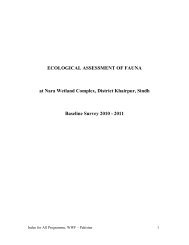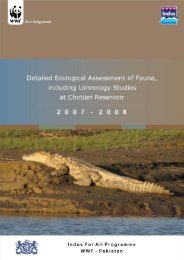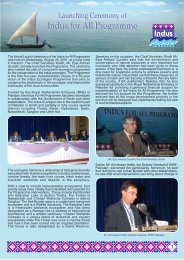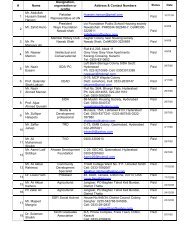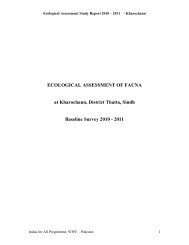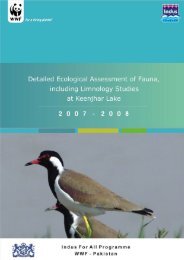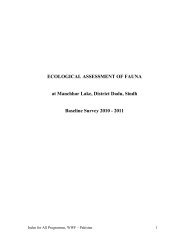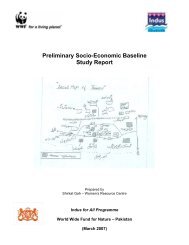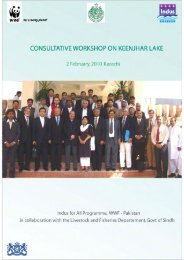Disclaimer note - WWF - Pakistan
Disclaimer note - WWF - Pakistan
Disclaimer note - WWF - Pakistan
You also want an ePaper? Increase the reach of your titles
YUMPU automatically turns print PDFs into web optimized ePapers that Google loves.
Detailed Ecological Assessment Report 2008 – Keti Bunder<br />
3.1.6 Threats and recommendations<br />
3.1.6.1 Threats<br />
• Persecuted wildlife: Species such as jackal and jungle cats predate on<br />
poultry and therefore locals shoot or trap these species whenever they get<br />
the chance to;<br />
• Food competition: Hundreds of feral dogs in the study area are not only<br />
a problem for the local residents but also for the wild animals. These are<br />
the major food competitors for most of the carnivore species in the area.<br />
Wild animals like jungle cat, fishing cat, jackal etc. are facing threats from<br />
the locals as they consider these as problem species. Feral dogs on the<br />
contrary, having been sheltered by man, face no problems at all and thus<br />
offer a real food competition for wild animals near human habitations as<br />
well as away from them;<br />
• Lack of awareness: Usually the general public is not familiar with the<br />
wildlife, its positive role and ecological importance. Killing, hunting and<br />
trapping of wild animals is the result of such unawareness and a hurdle in<br />
wildlife conservation. Indian pangolin is a harmless animal but it is<br />
considered a fearful animal and killed whenever encountered;<br />
• Pollution: Excessive pollution in the creek system is resulting in the<br />
unavailability of food for marine life as well as habitat degradation. The<br />
creek system receives untreated upland runoff, coastal dumps and<br />
domestic sewage which drain into creeks. Marine pollution mostly consists<br />
of synthetic materials resistant to degradation in marine environment. The<br />
oil and oil dispersants from the boats are also source of water pollution, all<br />
of which affect the marine ecosystem;<br />
• Entanglement of cetaceans in fishing gears: Dolphins and porpoises<br />
are injured or killed when entangled in fishing gear. The fishermen don’t<br />
try to rescue the dolphins when found entangled in their fishing nets and<br />
often let them die. They are often struck down by the motor boats, causing<br />
injury to the animal.<br />
3.1.6.2 Recommendations<br />
• Control on Feral dog population: Feral dog population at almost all the<br />
sites of Indus for All Programme is dominating the wildlife species. At Keti<br />
Bunder their population is almost double the population of livestock and<br />
thus a permanent threat for wildlife as well as for man. There have been<br />
few incidents of human deaths in the past due to dog bites (rabies) in Keti<br />
Bunder. People usually keep the dogs for security reasons as well as<br />
hunting purposes. But in Keti Bunder, most of the people do not need<br />
dogs. Thus there should be a check on population of feral dogs in the<br />
area.<br />
• Awareness raising campaign: General public is not much familiar with<br />
the wildlife and its ecological role. Therefore, there is a need for raising<br />
awareness among the general public about the importance of wildlife and<br />
its role in the ecosystem.<br />
<strong>WWF</strong> <strong>Pakistan</strong> – Indus for All Programme Page 39 of 188



